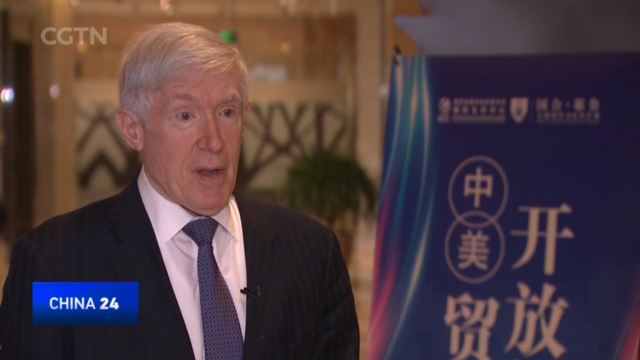
21:08, 15-Dec-2018
China-US Trade Ties: Insiders remain hopeful for further trade talks despite ongoing uncertainties
Updated
20:55, 18-Dec-2018
02:20

Following the fresh announcement of China's suspension of three-month tariffs on US-made vehicles and auto parts, scholars and industry insiders from both sides have gathered in Beijing, to discuss the outlook for trade ties. CGTN reporter Wang Mengzhen has the story.
Codependent, that's how veteran economist Stephen Roach described the China-US economic relationship. In a panel discussion over the weekend, Roach pointed out several key factors influencing the future of the trade dispute and one highlight was the imbalance in savings.
PROFESSOR STEPHEN S. ROACH YALE SCHOOL OF MANAGEMENT "China saves too much and the US saves too little, which gives rise to big bilateral trading imbalances between the two nations."
Roach admits that there are concerns surrounding Chinese investment in America, especially given the recent legislation enacted by Congress to tighten the oversight of foreign investment.
PROFESSOR STEPHEN S. ROACH YALE SCHOOL OF MANAGEMENT "Just like the US wants freer access to ownership in its investment in China, the US would have to compromise the recent tightening- up over restrictions on Chinese capital."
A Chinese Commerce Ministry spokesperson said on Thursday that China would welcome any US trade delegation to visit the country and is keeping an 'open attitude' to visiting the US.
On Friday night, China announced the suspension of 3-month tariffs on US-made vehicles and auto parts. This was done to carry out the consensus reached by the two sides' leaders at the G20 Summit.
Uncertainties still remain for the future of China-US trade relations. But at least experts here reached a consensus that both sides are now more open to further dialogue on this matter. WMZ, CGTN, BEIJING.

SITEMAP
Copyright © 2018 CGTN. Beijing ICP prepared NO.16065310-3
Copyright © 2018 CGTN. Beijing ICP prepared NO.16065310-3